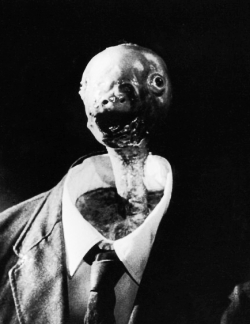I think that you are misunderstanding what they likely mean by "roman" in this context. Note that it's lowercase "roman." It's a reference to novels and literary books rather than Roman history. This use even exists in other languages: e.g., the German word for 'novel' is "Roman" (capitalized because a noun) as is the French word for 'novel' likewise "roman." And this exists in certain literary terms used in the field: e.g., Bildungsroman, which refers to a novel about a character's formative period, education, or a "coming of age" story. So they are talking about early "horror" novels and novellas (i.e., 19th century): e.g., Frankenstein, Dracula, Invisible Man, Dr. Jekyll and Mr. Hyde, etc.




